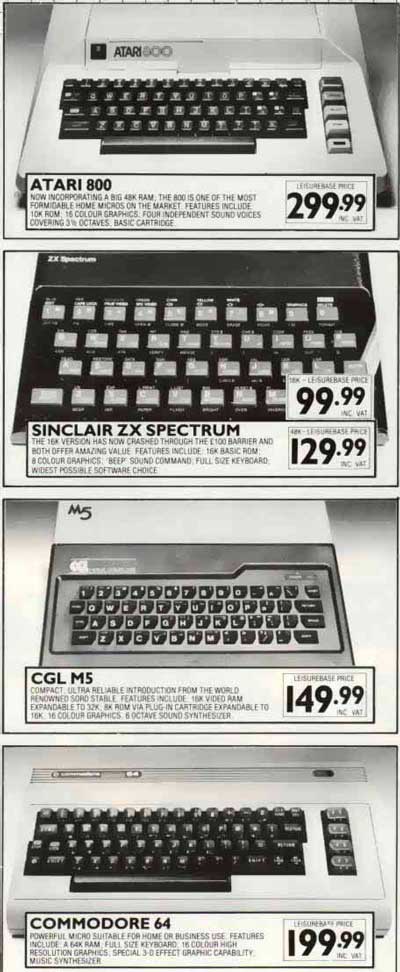 Even
in 1983, things were priced at one penny short of the pound. Was it
common in pre-decimal days?
Even
in 1983, things were priced at one penny short of the pound. Was it
common in pre-decimal days?
1983 was just on the eve of the video games crash, a crash which affected
the home computer market as well. In 1983 it was possible for computer
magazines to run charts of the fifteen best-selling home computers of
the last month; a year later, the 8-bit market had condensed down to
the Sinclair Spectrum, Commodore C64, Amstrad CPC and, a great distance
behind, the MSX.
Of the machines here, the Spectrum and C64 were deadly rivals. The C64
was technically superior, but very expensive, whilst the Spectrum had
a much larger software library, but was technically limited (although
the Spectrum version of Elite was much better than the C64 version).
And it was British, too. Back in 1983 that mattered to some people.
I can't think of any reason why people would choose to buy an Austin
Maestro over a Volkswagen Golf.
Note the odd selling points that the text mentions - did people really
buy the Atari 800 because it had '10K ROM'?
Very few people bought the 16k Spectrum, and most of those that did
had their machine upgraded at some point. 16k Spectrums are now quite
rare, and worth more than 48k models. Of all the things that could have
been used to sell the Spectrum, 'Beep' - literally, the only sound the
machine could make - was not the best. The C64's 'SID' sound chip was
superior in every possible way, so much so that people are nowadays
prepared to pay several hundred pounds for a 'SIDStation', a C64 sound
chip in a MIDI-equipped box.
Sord's M5 - imported into the UK from Japan by CGL - came and went in
half a second. It had a rubber keyboard and no games.
The C64 was always slightly less popular than the Spectrum in the UK
- in America, it had to compete with machines from Texas Instruments
and Apple, whereas in Europe it became almost the default choice. Two
generations of Eastern European computer enthusiasts cut their teeth
on C64s, and clones are still available in China and Russia. This raises
the possibility that somebody might have written a web browser for one.
I can't remember the C64 ever having a 'special 3-D effect graphic capability'.
It had hardware sprites and a proper keyboard and was quite solidly
built.